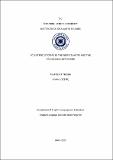JavaScript is disabled for your browser. Some features of this site may not work without it.
| dc.contributor.author | ÖZENÇ, Ardeniz
|
|
| dc.date.accessioned | 2021-04-22T11:33:51Z | |
| dc.date.available | 2021-04-22T11:33:51Z | |
| dc.date.issued | 2020 | |
| dc.identifier.uri | http://hdl.handle.net/11547/7359 | |
| dc.description.abstract | About five hundred years ago, Europeans started to set sail across oceans and settled in continents outside Europe in large numbers. While “discovering” the rest of the world, they found that the new world before their eyes, had an immense amount of riches that needed to be cultivated. So, they started on developing new tools to refine it, and while doing so, they discovered their ability to mould nature in the direction they pleased. This new age of discoveries naturally led to the Industrial Revolution in 19th century, through which systematic exploration and alongside it, exploitation, were possible. All of these developments eventually prompted the most powerful European nations to go to war with each other over supremacy, which resulted in millions of deaths and loss of valuable resources that were wasted in wars. However, after 1950s, European nations and America stopped quarrelling with each other, and turned their attention to developing new technologies and making scientific improvements. They gave the whole world internet, which connects people through machines even from the remotest regions in the world. Via GPS, people can find their own location almost anywhere on Earth, simply by sending signals from their smartphones to the satellites that roam the wide and infinite space. About four hundred years ago, philosophers and thinkers, such as Tommaso Campanella, foresaw “that the coming age would have more history within a hundred years ‘than all the world had had in the four thousand years before’” (Mumford, 1964). English politician and philosopher of 16th and 17th centuries, Francis Bacon, argued that political changes would go in cooperation with scientific and technological developments (Mitchell, 2006). Just like the age of discovery, we are now in an age of information, and the data that has been accumulated since the beginning of the 21st century far surpasses what had been accumulated before. Countless scientific discoveries and technological innovations are being made and used by a lot of people all around the globe. These developments are not always used constructively and equally by everyone, and at the same time, governments are also abusing the privacy of their citizens by keeping tabs on them and exploiting the data collected through the citizens’ use of these technologies. However, with the developments made in science and technology, we stand on the threshold of the new coming age, which would transform our existence into something that has never been seen before. Transhumanists, like the writer Zoltan Istvan and many other scientists, philosophers, thinkers and so on, believe that the new age, as a result of the technological innovations it provides, will make it possible for humanity to evolve into a different and superior form of being. Other thinkers, such as political scientist Francis Fukuyama, argue that the transhuman form of humanity will bring along a moral dilemma about the essence of being a human. Only time will show us how this new form would come into existence, if at all, and how the world we live in will be altered viii by the rapid changes in its physical conditions. One thing is certain that, just like hundreds of years ago in the age of discoveries, we are going to keep witnessing and experiencing great transformations in our lives. Both writers, whose works are analysed in this thesis, Francis Bacon and Zoltan Istvan, hoped that science and technology would be the greatest means humans could use in their struggle against nature, and that humanity would finally reach omnipotence and immortality. They both depicted such utopias in their novels, New Atlantis and the Transhumanist Wager. The two scientific utopias, written about four hundred years apart from each other, underline the importance of science and technology in human life, and how they would serve humans to attain full control of their surroundings. In New Atlantis, Bacon depicts a society which has mastered nature and its whims, with its political, social and cultural institutions all serving for one unified purpose. In the Transhumanist Wager, humanity is still at large in reaching its goal of immortality. Istvan describes the challenges of building such a perfect society that values science and knowledge over religion and politics. However, in the end, humanity triumphs over death, and nature is subdued against the powers of the new form of existence of humans, or transhumans. In both books, it is emphasised that science and technology would be the best options to guide people in maintaining control over their lives and in building the perfect societies. | tr_TR |
| dc.subject | Utopia | tr_TR |
| dc.subject | Francis Bacon | tr_TR |
| dc.subject | trashumanism | tr_TR |
| dc.subject | Humanity | tr_TR |
| dc.subject | Nature | tr_TR |
| dc.subject | Technology | tr_TR |
| dc.subject | Science | tr_TR |
| dc.subject | Utopia | tr_TR |
| dc.subject | Scientific Utopia | tr_TR |
| dc.title | SCIENTIFIC UTOPIAS IN THE NEW ATLANTIS AND THE TRANSHUMANIST WAGER | tr_TR |
| dc.type | Thesis | tr_TR |
Bu öğenin dosyaları:
Bu öğe aşağıdaki koleksiyon(lar)da görünmektedir.
-
Tezler -- Thesis [3470]
